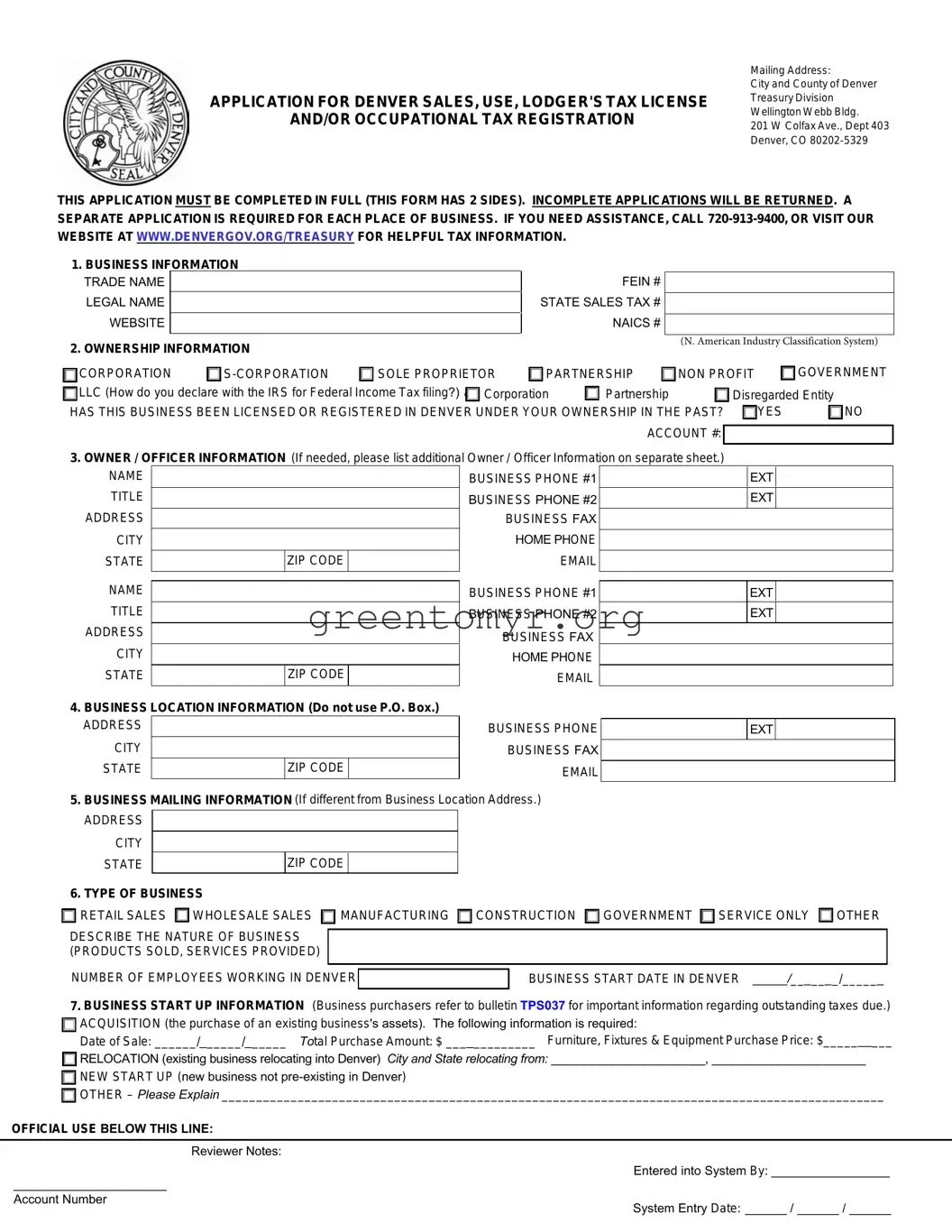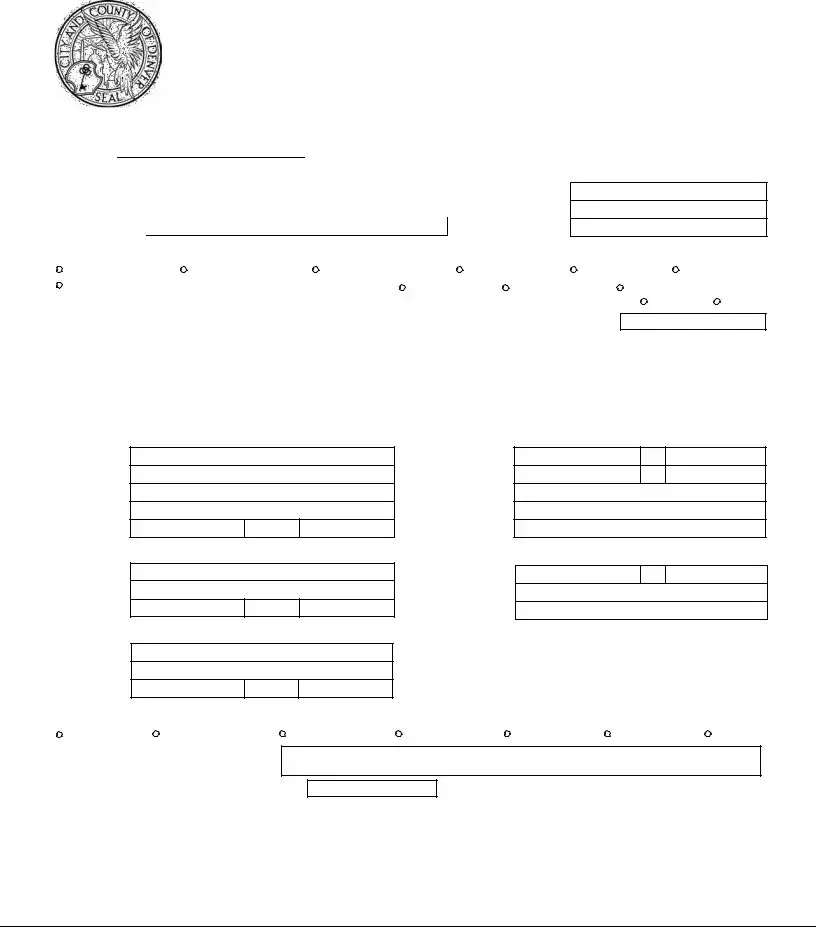APPLICATION FOR DENVER SALES, USE, LODGER'S TAX LICENSE
AND/OR OCCUPATIONAL TAX REGISTRATION
Mailing Address:
City and County of Denver
Treasury Division
Wellington Webb Bldg.
201 W Colfax Ave., Dept 403
Denver, CO 80202-5329
THIS APPLICATION MUST BE COMPLETED IN FULL (THIS FORM HAS 2 SIDES). INCOMPLETE APPLICATIONS WILL BE RETURNED. A SEPARATE APPLICATION IS REQUIRED FOR EACH PLACE OF BUSINESS. IF YOU NEED ASSISTANCE, CALL 720-913-9400, OR VISIT OUR WEBSITE AT WWW.DENVERGOV.ORG/TREASURY FOR HELPFUL TAX INFORMATION.
1. BUSINESS INFORMATION |
FEIN # |
TRADE NAME |
|
LEGAL NAME |
|
STATE SALES TAX # |
WEBSITE |
|
NAICS # |
2. OWNERSHIP INFORMATION |
|
|
|
(N. American Industry Classification System) |
|
|
|
|
|
|
CORPORATION |
S-CORPORATION |
SOLE PROPRIETOR |
PARTNERSHIP |
NON PROFIT |
GOVERNMENT |
LLC (How do you declare with the IRS for Federal Income Tax filing?) Corporation |
Partnership |
|
Disregarded Entity |
HAS THIS BUSINESS BEEN LICENSED OR REGISTERED IN DENVER UNDER YOUR OWNERSHIP IN THE PAST? |
YES |
NO |
ACCOUNT #:
3.OWNER / OFFICER INFORMATION (If needed, please list additional Owner / Officer Information on separate sheet.)
NAME |
|
|
|
BUSINESS PHONE #1 |
|
EXT |
|
TITLE |
|
|
|
BUSINESS PHONE #2 |
|
EXT |
|
|
ADDRESS |
|
|
|
BUSINESS FAX |
|
|
|
|
CITY |
|
|
|
HOME PHONE |
|
|
|
|
STATE |
|
ZIP CODE |
|
EMAIL |
|
|
|
|
NAME |
|
TITLE |
|
ADDRESS |
|
CITY |
|
STATE |
ZIP CODE |
4.BUSINESS LOCATION INFORMATION (Do not use P.O. Box.)
ADDRESS
BUSINESS PHONE #1 BUSINESS PHONE #2 BUSINESS FAX HOME PHONE EMAIL
BUSINESS PHONE BUSINESS FAX EMAIL
5. BUSINESS MAILING INFORMATION (If different from Business Location Address.)
6. TYPE OF BUSINESS |
|
|
|
|
|
RETAIL SALES |
WHOLESALE SALES |
MANUFACTURING |
CONSTRUCTION |
GOVERNMENT |
SERVICE ONLY |
OTHER |
DESCRIBE THE NATURE OF BUSINESS |
|
|
|
|
|
(PRODUCTS SOLD, SERVICES PROVIDED) |
|
|
|
|
|
NUMBER OF EMPLOYEES WORKING IN DENVER |
BUSINESS START DATE IN DENVER _____/_______/______ |
7.BUSINESS START UP INFORMATION (Business purchasers refer to bulletin TPS037 for important information regarding outstanding taxes due.)  ACQUISITION (the purchase of an existing business's assets). The following information is required:
ACQUISITION (the purchase of an existing business's assets). The following information is required:
Date of Sale: ______/______/______ Total Purchase Amount: $ _____________ Furniture, Fixtures & Equipment Purchase Price: $__________
 RELOCATION (existing business relocating into Denver) City and State relocating from: _______________________, _______________________
RELOCATION (existing business relocating into Denver) City and State relocating from: _______________________, _______________________
 NEW START UP (new business not pre-existing in Denver)
NEW START UP (new business not pre-existing in Denver)
 OTHER – Please Explain ________________________________________________________________________________________________
OTHER – Please Explain ________________________________________________________________________________________________
OFFICIAL USE BELOW THIS LINE:
|
Reviewer Notes: |
______________________ |
Entered into System By: _________________ |
|
Account Number |
System Entry Date: ______ / ______ / ______ |
|
8.TAX TYPE INFORMATION
a)OCCUPATIONAL PRIVILEGE TAX ACCOUNT
THE CITY AND COUNTY OF DENVER IMPOSES AN OCCUPATIONAL PRIVILEGE TAX ON INDIVIDUALS WHO WORK WITHIN THE CITY LIMITS OF DENVER. THE EMPLOYEE NEED NOT LIVE IN DENVER AND THE BUSINESS NEED NOT BE BASED IN DENVER, THE PERSON NEED ONLY PERFORM SERVICES WITHIN THE CITY (REQUEST TPS003 FOR MORE INFORMATION).ANNUAL FILING IS ALLOWED ONLY FOR INDIVIDUALS, SOLE PROPRIETORS, AND PARTNERSHIPS WITHOUT ANY EMPLOYEES.UNQUALIFIED SELECTION OF THIS FILING FREQUENCY MAY RESULT IN THE ASSESSMENT OF LATE FILING PENALTIES AND INTEREST.
TAX WILL BE FILED BY: |
SELF |
FILING FREQUENCY: |
MONTHLY (MORE THAN 10 EMPLOYEES) |
|
3RD PARTY |
|
QUARTERLY (10 OR FEWER EMPLOYEES) |
b) CONSUMER USE TAX ACCOUNT (No License Fee.) |
|
ANNUALLY (SEE ABOVE) |
|
|
IF YOU BUY TANGIBLE PERSONAL PROPERTY FOR OWN USE AND THE VENDOR DOES NOT COLLECT DENVER SALES TAX ON THE INVOICE, THE TAX DUE TO DENVER MUST BE REPORTED AND PAID TO DENVER. THIS INCLUDES PERSONAL PROPERTY ACQUIRED WITH THE PURCHASE OF A BUSINESS (REQUEST TPS002 FOR MORE INFORMATION).
TAX WILL BE FILED BY: |
SELF |
FILING FREQUENCY: |
MONTHLY ($300 / MONTH OR MORE IS DUE) |
|
3RD PARTY |
|
QUARTERLY (LESS THAN $300 / MONTH IS DUE) |
c) SALES TAX LICENSE |
|
|
ANNUALLY (LESS THAN $15 / MONTH IS DUE) |
|
|
|
LICENSE IS REQUIRED IF YOU ARE A DENVER VENDOR. THE LICENSE AUTHORIZES YOU TO COLLECT AND REMIT SALES TAX YOU MAY OWE (REQUEST TPS001 FOR MORE INFORMATION). A TAX LICENSE IS NOT A LICENSE TO DO BUSINESS. ADDITIONAL BUSINESS LICENSES OR PERMITS MAY BE REQUIRED BY OTHER CITY DEPARTMENTS, EXCISE AND LICENSES DEPARTMENT (720-913-2743) CAN PROVIDE INFORMATION FOR BUSINESS LICENSES.
TAX WILL BE FILED BY: |
SELF |
FILING FREQUENCY: |
MONTHLY ($300 / MONTH OR MORE IS DUE) |
|
|
|
3RD PARTY |
|
QUARTERLY (LESS THAN $300 / MONTH IS DUE) |
d) RETAILER'S USE TAX LICENSE |
|
ANNUALLY (LESS THAN $15 / MONTH IS DUE) |
|
|
BUSINESSES LOCATED OUTSIDE OF DENVER MAY BE REQUIRED TO COLLECT RETAILER'S USE TAX (TAX ON DELIVERIES INTO DENVER AT THE SALES TAX RATE). IF REQUIRED TO COLLECT THE TAX, YOU MUST APPLY FOR A LICENSE.
TAX WILL BE FILED BY: |
SELF |
FILING FREQUENCY: |
MONTHLY ($300 / MONTH OR MORE IS DUE) |
|
3RD PARTY |
|
QUARTERLY (LESS THAN $300 / MONTH IS DUE) |
e) LODGER'S TAX LICENSE |
|
|
ANNUALLY (LESS THAN $15 / MONTH IS DUE) |
LICENSE IS REQUIRED, IF YOU FURNISH ROOMS OR ACCOMMODATIONS IN THE CITY OF DENVER FOR A PERIOD OF LESS THAN 30 CONSECUTIVE DAYS. A FEE IS REQUIRED, IF THE APPLICATION IS NOT COMBINED WITH A SALES TAX APPLICATION.
TAX WILL BE FILED BY: |
SELF |
FILING FREQUENCY: |
MONTHLY ($300 / MONTH OR MORE IS DUE) |
|
3RD PARTY |
|
QUARTERLY (LESS THAN $300 / MONTH IS DUE) |
f) TOURISM IMPROVEMENT DISTRICT TAX ACCOUNT (No License Fee) |
ANNUALLY (LESS THAN $15 / MONTH IS DUE) |
HOTELS WITH 50 OR MORE ROOMS ARE REQUIRED TO COLLECT THE TOURISM IMPROVEMENT DISTRICT TAX WHICH WILL BE FILED ON THE SAME RETURN AS LODGERS TAX. IF YOU ARE A HOTEL, PLEASE INDICATE HOW MANY ROOMS YOU HAVE.
1-49 ROOMS
50 OR MORE ROOMS NOTE: HOTELS WITH 50 OR MORE ROOMS ARE REQUIRED TO FILE ONLINE.
9. LICENSE FEE AND RENEWAL PERIOD
LICENSES WILL BE ISSUED FOR A TWO-YEAR PERIOD, RENEWABLE ON A BIENNIAL BASIS BY JANUARY 1. IT IS THE DUTY OF EACH LICENSEE ON OR BEFORE JANUARY 1 OF EVEN-NUMBERED YEARS FOLLOWING THE YEAR IN WHICH THEIR LICENSE IS ISSUED, OR RENEWED TO COMPLETE A RENEWAL FORM IF THEY REMAIN IN RETAIL BUSINESS. LICENSE FEES RECOVER THE ADMINISTRATIVE COST OF ESTABLISHING AND MAINTAINING TAX ACCOUNTS AND ARE NON-REFUNDABLE.
10. LICENSE FEE PRORATION SCHEDULE
TAX LICENSE TYPES |
|
PRO-RATED FEES IF BUSINESS BEGINS |
MAKE CHECKS PAYABLE TO "MANAGER OF FINANCE" |
CIRCLE ONE ONLY |
Jan. 1. 2020 to |
July 1. 2020 to |
Jan. 1. 2021 to |
July 1. 2021 to |
|
(see mailing address on 1st page) |
June 30, 2020 |
Dec. 31, 2020 |
June 30, 2021 |
Dec. 31, 2021 |
|
LICENSE FEE REMITTED: |
|
|
SALES TAX |
$50.00 |
$37.50 |
$25.00 |
$12.50 |
|
|
|
SALES & LODGER'S TAX |
$50.00 |
$37.50 |
$25.00 |
$12.50 |
$ |
|
|
LODGER'S TAX |
$50.00 |
$37.50 |
$25.00 |
$12.50 |
|
|
|
|
|
RETAILER'S USE TAX |
$50.00 |
$37.50 |
$25.00 |
$12.50 |
|
|
|
11.CONTACTS (If different from Main Business Contact.)
TAX TYPE |
OCCUPATIONAL PRIVILEGE TAX |
CONSUMER USE TAX |
SALES / RETAILER'S USE TAX |
LODGER'S TAX |
CONTACT PERSON |
|
|
|
|
|
|
|
|
|
|
|
|
|
|
|
|
|
|
|
|
|
|
|
|
|
TITLE |
|
|
|
|
|
|
|
|
|
|
|
|
BUSINESS PHONE |
|
EXT |
|
|
EXT |
|
|
EXT |
|
|
EXT |
|
BUSINESS FAX |
|
|
|
|
|
|
|
|
|
|
|
|
|
|
|
|
|
|
|
|
|
|
|
|
|
EMAIL |
|
|
|
|
|
|
|
|
|
|
|
|
|
|
|
|
|
|
|
|
|
|
|
|
|
12.MAILING ADDRESSES (If different from Main Business Mailing Address.)
TAX TYPE |
OCCUPATIONAL PRIVILEGE TAX |
CONSUMER USE TAX |
SALES / RETAILER'S USE TAX |
LODGER'S TAX |
MAILING ADDRESS |
|
|
|
|
CITY |
|
|
|
|
STATE |
ZIP |
ZIP |
ZIP |
ZIP |
I HEREBY CERTIFY UNDER PENALTY OF PERJURY, THAT THE STATEMENTS MADE HEREIN ARE TO THE BEST OF MY KNOWLEDGE TRUE, CORRECT AND COMPLETE.
SIGNATURE OF APPLICANT |
|
TITLE |
|
DATE |


 ACQUISITION (the purchase of an existing business's assets). The following information is required:
ACQUISITION (the purchase of an existing business's assets). The following information is required: RELOCATION (existing business relocating into Denver)
RELOCATION (existing business relocating into Denver)  NEW START UP (new business not
NEW START UP (new business not  OTHER –
OTHER – 